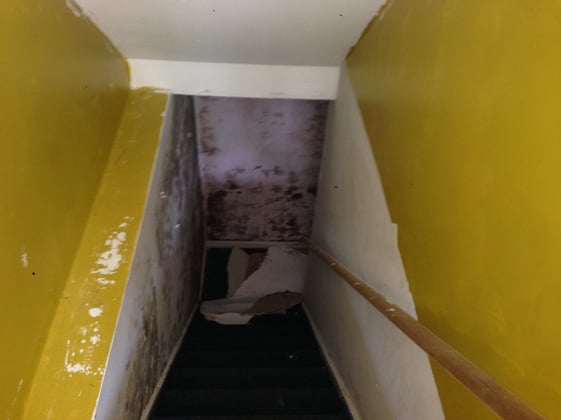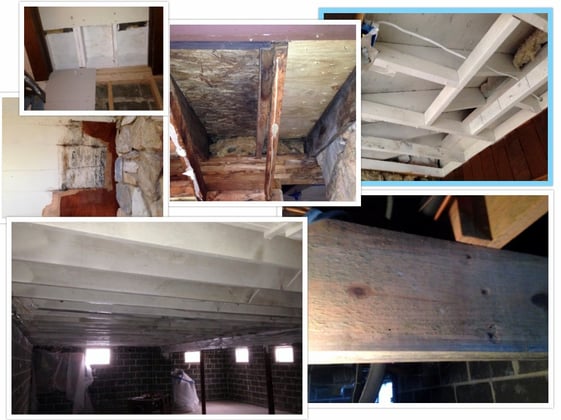If someone says “Black Mold” or even asks “Is that black mold?” I cringe. In today’s society, people are deathly afraid of black mold and what it will do to you. I even see my industry peers (I use peers rather lightly) tell people about the “Black Mold”. The fact is there is no mold that is called black mold. Yes, that is correct - no mold called black mold. I have seen countless laboratory reports where mold testing was performed and nowhere is there a mold called black mold on that laboratory analytical report. Most molds have very difficult names to spell and pronounce such as Alternaria, Penecillium/Aspergillus, Chaetomium, Basidiospores, Ulocladium and Smuts (OK, Smuts is an easy one to pronounce). The term Black Mold originated from the media to create hype for mold issues and scare the public. In the mold industry, the term is used by nonprofessionals to scare and misinform people. I say this is as the CDC (Centers for Disease Control, EPA (Environmental Protection Agency ) and laboratories that test for mold do not recognize any mold referred to as black mold.
Why should you NOT be afraid of black mold? Because black mold is not a type of mold, black mold is a color of mold and there are many different molds that are white, grey and black, but there is not a specific type of mold called black mold. The term black mold should scare you, because if a mold company representative tells you that you have black mold, well then the next thing they are going to tell you or I mean sell you is a bridge (kidding). What they will sell you is a mold remediation that may or may not be warranted. Let’s face it if you see mold you have mold, if you smell musty odors (the odor is mold growing and off gassing) you have mold and need remediation (remediation = Removal). When people try and scare you with fictitious molds, well then they are playing off fear and trying to steer you toward an emotional decision rather than a well thought out decision.
Look at the facts if you have mold, it has been growing for some time, weeks, months years. When the temperature and moisture conditions are right, mold grows. Mold needs a 48 to 72 hour incubation period to grow, meaning if you get something wet and dry it out fast, no mold will grow. Mold doesn’t grow everyday but when the conditions are right mold will grow and when the conditions are not conducive mold goes dormant like grass in winter.
Now back to “I have mold” because you see it and it is everywhere and were told it is black mold. It was in your crawl space so you think you get a pass because you’re a clean person and don’t go into the crawl space because it is not clean in there. Now that you have looked in there you can see mold growth and it looks bad and you are told it is the worst they have seen. Then you are told you have an emergency mold remediation. Seriously, I am not making this stuff up, these are actual comments people say to us, who met with so-called mold professionals. First, you have mold, next is why do you have mold? You need to find the water source, as mold doesn’t grow without water, fix the water problem BEFORE you remediate otherwise the mold can grow back. Emergency and mold really shouldn’t be in the same sentence because mold takes as long to grow as does getting your “Honey Do List” completed. In situations where the mold firm pushing alarm buttons, step back, you need to call another company to assess your mold issue, because the company in this scenario is not providing a competent consultation. I like decisions based on facts not scare tactics.
When should you get a second opinion about Mold?
- When you are told you have black mold.
- When you are told your mold is the worst they have ever seen.
- When you are told that the mold is an emergency.
- The firm you are dealing with does 24 hour mold removal emergency service.
- When you feel like who you are dealing with may not be 100% honest.
Mold can be alarming, the presence of mold points to a moisture issue, which can lead to having to repair what is causing the water problem such as roof, plumbing leak or gutters. The water and mold problem can also mean that you have to replace water (mold damaged) building materials such as wall studs, sheetrock, etc. So yeah, mold can be scary to your wallet. Mold also has a variety of health concerns that affect people differently and some people not at all. Remember some people have peanut allergies, gluten issues, allergies to cats and some mold.
What should you do if you have mold?
- Find the water issue and correct it. Stopping water stops mold growth.
- Speak with a mold professionals (they are rare) about how to correct the issue.
- Remember mold remediation is not the killing of mold as dead mold spores can affect you. Mold remediation is the removal of mold.
- Hire a firm that you feel has the competence to address your mold issue. Mold remediation costs vary widely or should I say wildly. Remediation costs should be tied to equipment as well as labor and material utilized to remediate your problem. Most every mold remediation will entail applying a fungicidal encapsulate (expensive paint that prevents future mold growth) that is applied to remaining organic surfaces. This encapsulate can kill any spores that remain and treats the surface to prevent future growth. We find that while people may fix one water issue that caused the mold, there may be a second or third source that is not as obvious. These coatings provide a safety net to prevent mold growth in the future. The better ones cost more but come with 10 year warranties.
- Warranties from mold companies are useless as companies come and go. Warranties from mold coating firms are priceless.
Now you know that “Black Mold” is not type of mold and Mold issues are typically not an emergency. When you are told, you have black mold and it is an emergency you know you need to find another firm. Thank them and find someone reputable. Stay away from firms that do not have a physical address (PO Box means no), firms that work out of their homes are also questionable as mold remediation is physical labor-intensive work. Home based firms typically subcontract the work, which adds needless expense.



